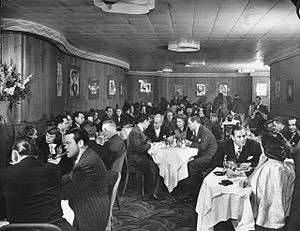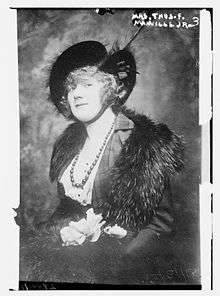Tommy Manville
Thomas Franklyn Manville, Jr., universally known as Tommy Manville (April 9, 1894 – October 9, 1967), was a Manhattan socialite and heir to the Johns-Manville asbestos fortune. He was a celebrity in the mid-20th Century due to both his inherited wealth and his record-breaking 13 marriages to 11 women, which won him an entry in the Guinness Book of World Records. The termination of his marriages usually resulted in gossip, widespread publicity, and huge cash settlements.[1]
Tommy Manville | |
|---|---|
 Manville (center) at the Stork Club in New York City (1944) | |
| Born | Thomas Franklyn Manville, Jr. April 9, 1894 |
| Died | October 9, 1967 (aged 73) |
| Resting place | Kensico Cemetery, New Rochelle, New York |
| Nationality | American |
| Occupation | Businessperson |
| Parent(s) |
|
Biography
Early life and first wives

Born April 9, 1894, Thomas Franklyn Manville, Jr. was the son of the founder and chairman of the Johns-Manville Corporation. His grandfather was Charles B. Manville.[2] Manville stated that he and his father did not get along and that his father repeatedly disinherited him. However, Manville’s father always relented, and Manville received an inheritance after his father’s death.[3] Among other accomplishments, his father Thomas F. Manville became a director of Consolidated National Bank in 1904.[4]
Determined to wed, Manville was 17 years old in 1911 when he met Florence Huber, a chorus girl, under a Broadway marquee. They were married five days later. Manville’s father, who was traveling from Europe to the United States, said he would have the match annulled when he reached New York. Manville arranged a second wedding ceremony in New Jersey, tried to have another in Maryland, and said that he would, if necessary, remarry his bride in most of the then-46 states. When his father shut the family treasury against him, Manville took a $15 a week job in the family's Pittsburgh factory in order to get by.
Manville’s first marriage lasted 11 years. However, he and his wife separated in 1917, remaining separated until their divorce in April, 1922. He married Lois Arline McCoin, his father's 22-year-old stenographer, in September 1925. The next month, Manville’s father died, leaving him about $10 million of a $50 million estate. In 1926, McCoin charged desertion and received a settlement of $19,000 a year. She died in 1929.
Subsequent Marriages
Manville soon began describing himself as a "retired businessman," or gave his occupation as "looking after my estate." Manville took 11 wives in 13 marriages. He remarried twice and was divorced from 10 of them a total of 11 times. In May 1931, he married Avonne Taylor, a Follies girl. She had been wed twice before. They separated after 34 days, and were divorced that November. In October 1933, Manville married Marcelle Edwards, a showgirl. They divorced in October 1937 after a $200,000 settlement.
In November 1941, he married Bonita Edwards, a 22-year-old showgirl. They were divorced in January 1942.
In October 1942 he married Wilhelmma Connelly (Billy) Boze, a 20-year-old actress. They were divorced in February 1943; Miss Boze distinguished herself among Manville's former wives by steadfastly refusing to take any money in settlement.
In August 1943, Manville married Macie Marie (Sunny) Ainsworth. She had been married four times by age 20. They were separated after eight hours and divorced in October 1943.
In December 1945, he married British-born Georgina Campbell. She was killed in an automobile collision in 1952 while driving to have breakfast with her husband at "Bon Repos." "We have been friends," Manville said of his wife at the crash scene.
In July 1952 he married Anita Frances Roddy-Eden. She obtained a Mexican divorce in August, and accepted S100,000 in lieu of alimony.
In May 1957, Manville married his 10th wife, Pat Gaston, a 26-year-old Texas showgirl. They divorced in November of that year.
Manville married his 11th and final wife, 20-year-old Christina Erdlen, in January 1960.
Though the record is confused, there were two remarriages among Manville’s first ten marriages.
This extraordinary cycle of marriage and divorce was Manville’s claim to celebrity. He reportedly used marriage as a means of personal publicity. In a story appearing under his name in the American Weekly magazine in 1936, he made sport of his marital propensities and pledged that his next wife would be a blonde—almost any blonde. The next year he took out full-page advertisements in New York newspapers, publicly seeking a new lawyer to represent him in family disputes.
Estate
He owned the estate "Bon Repos" in the gated waterfront community of Premium Point on Long Island Sound in New Rochelle, New York.[5] While he reveled in the publicity surrounding his marriages, Manville sought privacy on his estate. He equipped it with burglar alarms, peephole doors, armed guards, a public-address system, a radio in every room, and 20 telephones. He called the estate his fortress, and often wore two heavy pistols on his belt. In June 1967, while Manville was in Doctors Hospital, three gunmen wearing black masks invaded his estate and stole an undetermined amount of cash, jewelry, furs, and clothing. Manville had been in ill health for several years, and his 11th wife, the former Christina Erdlen, was with him at the hospital when the estate was robbed.
Death and legacy
He died on October 9, 1967.
His ninth wife Anita Manville wrote a biography, The Wives and Lives of Tommy Manville, which was seen as the inspiration of the camp musical, Lucky Wonderful: 13 Musicals About Tommy Manville by Jackie Curtis. He was probably the model for Gary Cooper’s character in the 1938 motion picture Bluebeard's Eighth Wife. Manville is also mentioned in Irving Berlin’s song What Chance Have I with Love ("Tommy Manville's love is not returned/He sells asbestos and he has learned/ That with asbestos he still gets burned") and in many other passing pop-culture references and metaphors.
Manville was considered something of a clown (an image he cultivated with his public persona—part bon vivant, part hapless tool of women), but was also secretly admired by some for his number of conquests and his extravagant bank account. At the time of his death it was estimated that Manville spent more than $1.25 million on divorce settlements.[1]
References
- NY Times Obituary
- Ingham, John N. (1983). Biographical directory of American business leaders. H-M. ISBN 9780313239083. Retrieved May 8, 2018.
- Britannica.com
- "Topics in Wall Street", The New York Times, New York City, p. 12, April 16, 1904, retrieved January 19, 2017
- LIFEMagazine - "Bon Repos"
Sources
| Wikimedia Commons has media related to Tommy Manville. |
- Manville, Anita (1972). The Lives and Wives of Tommy Manville. ISBN 0491004397.